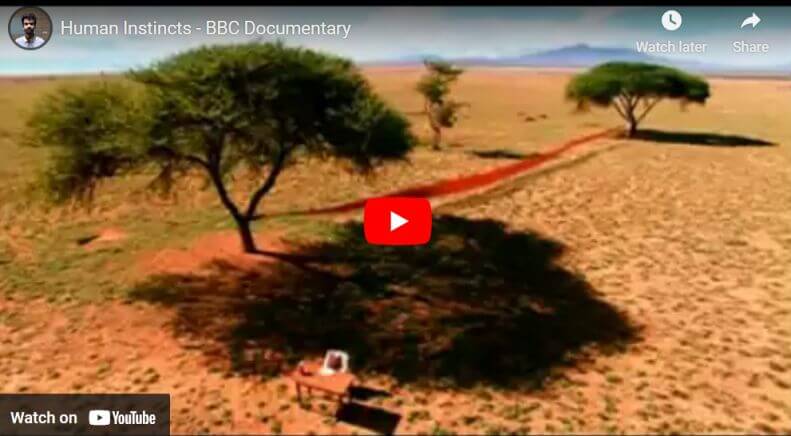Last updated on March 10th, 2024 at 04:49 pm
Understand the mechanics of human instincts, the innate and automatic behaviours that guide human actions.
From taking flight when in danger, to the maternal instincts of humans towards their offspring, this natural impulse plays a crucial role in shaping behaviour and decision-making.
For the context of this article, we are going to focus on human instincts.
Understanding the nature of the hard-wired drives of humans gives insights into the fundamental forces that have shaped life on Earth, influencing everything from survival strategies to complex social behaviours.
Recommended: What is Hero Instinct?
Table of Contents
- What are Human Instincts?
- Origins of Instincts
- Importance of Instincts
- How Instincts Shape Human Behaviour
- Instincts in Newborns
- The Role of Genes in Shaping Human Instincts
- Watch this Video: Human Instincts – BBC Documentary (24mins 50sec)
- Types of Human Instincts
- Instincts vs Learned Behaviours
- The Difference between Instincts and Learned Behaviour
- Psychological Aspects of Instincts
- Contemporary Psychology and Instinctual Drives
- Emotional Instincts in Decision-making
- The Role of Culture and Society in Shaping Human Instincts
- Cons of Instincts
- Examples of Human Instincts
- Human Instincts List
- Frequently Asked Questions
- A Word from The Conducts of Life
“Instinct is a marvelous thing. It can neither be explained nor ignored.”
-Agatha Christie-
What are Human Instincts?

Instincts Psychology Definition
In psychology, human instincts refer to innate, automatic behaviours or responses that are biologically determined and are crucial for humans’ survival and reproduction.
Human instincts are automatic behaviour or reaction that is shaped by evolution and enables humans to survive and adapt to their environment.
It is a natural, unconscious response to stimuli, occurring without deliberate thought or reasoning.
Instinctive responses have their roots in genetic programming and are characteristic of a species, guiding the actions of humans for essential activities such as feeding, mating, and self-defence.
They are deeply ingrained patterns of behaviour that have developed over time, enabling humans to excel in their specific environments.
This inborn drive often manifests as unlearned behaviours, triggered by specific cues in the surroundings, and contributes to the survival and propagation of a species.
Related: How Instincts Drive Desire for Status
Origins of Instincts

Charles Darwin’s Theories on Natural Selection and Survival Instincts
Charles Darwin proposed the theory of natural selection, which states that certain traits that provide a survival advantage will be more likely to be passed on to future generations.
In his work, Darwin also discussed the concept of instincts, which are innate behaviours that are genetically programmed in organisms without the need for learning or experience.
Role of Innate Behaviour in Species’ Adaptation and Survival
They play a crucial role in the adaptation and survival of species.
They are behaviours that have evolved to increase the chances of an organism’s survival and reproduction.
For example, hardwired drives like the nesting behaviour in birds or the migration behaviour in certain animal species are essential for the survival of these organisms and the continuation of their species.
Related: Ways Primal Instincts Keep You Alive
Importance of Instincts
Instincts are crucial for the survival, adaptation, and reproductive success of animals.
- They facilitate efficient decision-making and enable you to respond instinctively to environmental cues, often without conscious analysis.
- By providing innate responses to various stimuli, this natural response ensures the continuation of species, contributes to the equilibrium of ecosystems, and aids in the overall balance of nature.
- They drive our emotions, influence our relationships, shape our decision-making, and guide our actions in critical situations.
Moreover, while human behaviour is significantly influenced by cultural and learned experiences, underlying automatic continue to play a substantial role in shaping our responses.
Recommended: The Balance between Primal Instincts & Emotional Intelligence
How Instincts Shape Human Behaviour

Instincts play a significant role in shaping human behaviour.
For instance, instincts play a role in our decision-making skills. Our brain is hardwired to assess situations quickly and make instinctive decisions based on past experiences.
For example, if you encounter a dangerous animal, your instinct will be to fight or flee, based on your previous experiences and the information available to you at the time.
However, as we have evolved, we have developed the ability to override our instincts and make more rational decisions.
For example, you may choose to ignore your instinct to eat a sugary snack and opt for a healthier option instead.
We can also learn to control our emotions and not let our instincts take over in situations where it may not be appropriate.
While you may have the ability to override your instincts and make more rational decisions, instincts are still an essential part of who we are as living beings.
Understanding your instincts and how they shape your behaviour can help you make better decisions and live a more fulfilling life.
Related: Why You Should Trust Your Instinct in Relationships
Instincts in Newborns

In newborns, consciousness is well present but most of their reactions are instinctive.
They have natural impulses or reflexes that serve as survival or protective behaviours which aid them to thrive.
Babies are fully dependent on caregivers for survival as they are helpless.
Their response to stimuli can be observed as startling in response to a sharp noise, suckling of their hands in replica to the suckling of the breast.
These reflexes would continue until they are old enough to control their reactions to them and grow more control over their motor skills.
Common innate beahviours in babies include:
1. Moro Reflex: Also called the startle reflex. Babies respond to sharp loud noises by startling. This is a protective inborn drive in action. In adults, this is a quick rush of adrenaline in ready for any eventuality.
2. Sucking Reflex: The sucking reflex is the baby’s tendency to pull anything within reach to his lips. They also tend to grope for nipples when in their mother’s arms.
3. Tonic Neck Reflex: When babies are not hungry, they turn their heads away in rejection of breast milk offered to them.
4. Grasp Reflex: Grasping is a common reflex in babies. They tend to grasp at anything graspable and bring them toward their mouth.
5. Stepping Reflex: Babies try to take steps when they put their feet on the ground. It is a curious inborn drive that is not learned. You see them move their feet in a walking motion.
Related: Difference between Intuition and Instinct
The Role of Genes in Shaping Human Instincts
Genes play a crucial role in shaping human instincts. They carry the genetic information that determines an organism’s characteristics, including its instinctual behaviours.
Genetic variations and mutations can lead to the development of new inborn drives or alterations in existing ones.
The process of natural selection acts upon these genetic variations, favouring those intrinsic motivations that provide a survival advantage.
The origins of innate behaviour can be explained through an evolutionary perspective, which includes Charles Darwin’s theories on natural selection and the role of natural impulse in species’ adaptation and survival.
Related: Consequences of Ignoring Your Instincts
Watch this Video: Human Instincts – BBC Documentary (24mins 50sec)

Types of Human Instincts
Human innate behaviours can be categorized into various types, including:
1. Survival Instincts: These innate behaviours drive behaviours aimed at ensuring an individual’s survival, such as the fight-or-flight response in the face of danger and the drive to seek food, water, and shelter.
2. Social Instincts: This type governs social behaviours and interactions, including the need for companionship, cooperation, and the formation of social hierarchies.
3. Reproductive Instincts: These are related to the drive for procreation, including sexual attraction, mate selection, and parental behaviour related to caregiving and protecting offspring.
4. Aggression and Defense Instincts: These innate behaviours relate to the protection of oneself, one’s family, or one’s territory, and can manifest as aggression or defensive behaviours when threatened.
5. Exploration and Curiosity Instincts: These drive the desire to explore and understand the environment, promoting curiosity and the acquisition of knowledge.
See more on the five basic human instincts.
Instincts vs Learned Behaviours

Human instincts and learned behaviours are different types of human behaviours that have been shaped by evolution and individual experiences.
These behaviours are genetically programmed and are typically related to survival and reproduction.
As we have seen so far in this article, inborn drives are often seen in various forms across different individuals of the same species and are consistent within a species.
They are present from birth and do not require prior exposure or practice.
Learned Behaviours
On the other hand, learned behaviours are acquired through experiences and interactions with the environment.
These behaviours are developed and modified based on an individual’s ability to adapt and respond to their surroundings.
Learned behaviours are shaped by your previous encounters and can vary significantly between individuals of the same species.
They are not genetically predetermined and may change throughout your lifetime.
Examples of learned behaviours include tool use, social skills, hunting techniques, and various forms of communication.
While Intrinsic motivation provides you with a set of natural, automatic responses to certain stimuli, learned behaviours allow you to adapt to new situations and survive in changing environments.
Both inborn drive and learned behaviours contribute to your overall behaviour and play essential roles in your survival and continuity of life.
The Difference between Instincts and Learned Behaviour

Human instincts and learned behaviours are two different types of responses exhibited by organisms:
Instincts
- Instincts are innate, automatic behaviours or responses that an organism is born with.
- They are genetically programmed and are not the result of learning or experience.
- They are often universal within a species and are crucial for survival and reproduction.
Examples of human instincts include the suckling reflex in newborns, the migration patterns of birds, and the fight-or-flight response in the face of danger.
Learned Behaviours
- Learned behaviours are acquired through experience, observation, and education.
- They are not present at birth and develop as a result of an organism’s interactions with its environment.
- Learned behaviours can vary widely between individuals of the same species and can be modified over time.
Examples of learned behaviours include language acquisition, cultural traditions, and problem-solving skills developed through experience.
Psychological Aspects of Instincts

Psychological aspects of human instincts involve understanding their role in the unconscious mind, and their interaction with the different components of the psyche in Freud’s psychoanalytic theory.
It also covers their influence on human desires and choices according to contemporary psychology, including Maslow’s hierarchy of needs.
1. Freud’s Psychoanalytic Theory
According to Freud, instinct is the driving force behind human behaviour and are derived from the unconscious mind.
He identified two primary instincts:
- Eros: This represents life’s intrinsic behaviour and focuses on pleasure, and
- Thanatos, which represents the death inborn drive and is associated with aggression and destruction.
These human instincts operate at an unconscious level and can influence behaviour without you being aware of them.
2. Id, Ego, and Superego about Instincts
Freud proposed that the psyche is composed of three structures:
- The id,
- Ego, and
- Superego.
The id is the primitive and instinctual part of the psyche that operates according to the pleasure principle and seeks immediate gratification from innate behaviour.
The ego is the rational and reality-oriented part of the psyche that mediates between the id’s demands and the external world.
The superego represents societal values and moral standards. It internalizes societal norms and restrictions that can oppose the id’s instinctual desires.
Natural impulse plays a crucial role in the conflict between the id and superego and affects the behaviour mediated by the ego.
Contemporary Psychology and Instinctual Drives

1. Maslow’s Hierarchy of Needs and Instinctual Motivations
Contemporary psychology, or what you may call the modern psychology represented by Abraham Maslow’s hierarchy of needs, suggests that humans are motivated by a range of basic needs and desires.
These needs include physiological needs (such as food, water, and shelter), safety needs, love and belongingness needs, esteem needs, and self-actualization needs.
These needs are considered to be instinctual and serve as the driving force behind human motivation and behaviour.
2. The Influence of Instincts on Human Desires and Choices
Contemporary psychology acknowledges that human desires and choices are influenced by instinctual drives.
These instinctual drives can manifest in various ways, such as the drive for survival, the drive for reproduction, the drive for social connection, and the drive for achievement.
These inborn drives influence your decisions, the relationships you form, and the actions you take to fulfill your desires.
Relationship Between Instincts and Emotions
Innate behaviours and emotions are intertwined, with innate behaviour serving as foundational drivers that shape your emotional responses.
Additionally, the emotional primal urge can play a role in decision-making processes, providing quick intuitive responses and guiding risk assessment.
1. Instincts and Emotions Share Neural Pathways and Brain Structures
Instinctive behaviours and emotions are closely related and share common neural pathways and brain structures.
Both are processed in the limbic system of the brain, which includes structures like the amygdala and hippocampus.
This connection suggests that innate behaviours can influence emotional responses.
2. Impact of Instincts on Emotional Responses
Instincts can greatly influence your emotional responses. For example, the inborn drive to protect yourself or loved ones may elicit emotions like fear, anger, or even love.
Similarly, the instinctual drive for survival can trigger emotions like hunger or thirst.
Emotional Instincts in Decision-making
1. Gut Feelings and Intuitive Instincts
Gut feelings or intuitive instincts are intuitive responses that guide decision-making without necessarily relying on logical reasoning.
These can be strongly connected to emotions, as they are often based on past experiences and emotional memories.
This natural response can lead to quick and often accurate decisions.
2. Emotional Instincts in Risk Assessment
Emotions can also play a role in assessing risks. Natural responses to impulses related to self-preservation can trigger emotions like fear or caution, helping us evaluate potential dangers.
These emotional instincts can influence decision-making by guiding you away from risky situations or encouraging you to take calculated risks.
Connection between Instincts and Intuition
Instincts and intuition are intertwined in guiding human behaviour.
Both influence decision-making, with intuition often drawing on subtle cues and experiences to inform instinctual responses.
Understanding Intuition as an Instinctual Response
Intuition, often regarded as a mysterious and instinctual response, involves the subconscious processing of information based on past experiences, knowledge, and subtle cues.
It operates as a rapid, automatic assessment, guiding decisions without conscious reasoning.
While distinct from survival innate drive, intuition shares similarities with innate responses, as both are deeply ingrained and influence behaviour.
Intuition’s ability to swiftly assess complex situations and provide insights aligns with the adaptive nature of natural impulse, showcasing its role as an evolved cognitive mechanism.
Understanding intuition as a natural impulse sheds light on its influence on decision-making and human behaviour.
Developing and Trusting Intuitive Instincts
Developing intuitive instincts involves a heightened awareness of subtle signals like gut feelings and sudden insights.
Recognizing these signals promotes attunement to innate behaviour. Balancing instincts with rational thinking is crucial.
Rational analysis complements instinctual responses, leading to informed decisions.
Trusting intuition while considering logic enhances overall decision-making, harmonizing innate behaviour and reason for better outcomes.
The Role of Culture and Society in Shaping Human Instincts

Culture and society play a significant role in shaping human behaviour, including our instincts.
While our instincts are innate and hardwired, they are heavily influenced by the cultural and societal norms that we grow up with.
Let’s explore the role of culture and society in shaping human instincts.
Culture
Culture is a set of shared values, beliefs, customs, and practices that define a group of people.
It is passed down from generation to generation through language, traditions, and social norms.
Culture plays a crucial role in shaping our instincts by influencing our behaviour and perception of the world.
For example, the concept of time varies widely across different cultures. In some cultures, punctuality is highly valued, and being late is considered rude and disrespectful.
In contrast, in other cultures, time is viewed as more fluid, and being late is not as big of a deal.
This cultural difference can shape our instinctive behaviour, as we may feel the pressure to be punctual in one culture but not in another.
Related: What is a Collectivist Culture?
Society
Society, on the other hand, is a group of individuals living in a particular geographical location and sharing a common culture.
Society plays a critical role in shaping our instincts by influencing our behavior through social norms, laws, and institutions.
For example, in some societies, there is a strong emphasis on individualism, where people are encouraged to be independent and pursue their own goals.
In contrast, in other societies, there is a stronger emphasis on collectivism, where people are encouraged to work together and prioritize the needs of the group over their own needs.
These societal differences can shape our instincts, as we may feel more inclined to prioritize our individual needs in one society and prioritize the needs of the group in another.
It is important to note that culture and society can also shape our instincts in negative ways.
For example, if a culture or society values aggression and violence, individuals may be more inclined to behave aggressively and violently, even if it goes against their instincts of cooperation and empathy.
Cons of Instincts
1. Biased Judgments
Human instincts can lead to biased judgments and decisions.
Our survival instincts might cause us to automatically distrust or fear certain individuals or groups, based on stereotypes or past experiences, even when there is no actual threat.
2. Impulsivity
Some human instincts can lead to impulsive behavior, where we act without considering the consequences or weighing alternate options.
This can result in hasty decisions that we may regret later.
3. Conflict with Modern Society
Many of our instincts evolved in a different time and environments, and they can sometimes clash with the demands of modern society.
For example, our innate desire for high-calorie foods can lead to unhealthy eating habits in an environment where such foods are readily available.
4. Limited Rationality
While instincts can be helpful for quick decision-making, they often rely on heuristics or mental shortcuts, which may not always result in the most rational or optimal choices.
This can hinder our ability to think critically and make deliberate decisions.
5. Lack of Control
Human instincts can sometimes overpower rational thinking and self-control.
This can manifest in impulsive behaviors, addictions, or aggression.
It becomes necessary to develop strategies to manage and override these instincts when they are detrimental to ourselves or others.
Examples of Human Instincts
1. Maternal Instinct: The maternal instinct is one of the most well-known human instincts. Mothers have an innate drive to protect and nurture their offspring. This instinct ensures the survival and well-being of the young ones and plays a critical role in the continuation of life.
3. Fight or Flight Response: The fight or flight response is a fundamental innate behaivour that prepares you to face potential threats by activating your sympathetic nervous system. This response triggers various physiological changes, such as increased heart rate, heightened alertness, and the release of stress hormones, enabling individuals to respond to danger appropriately.
4. Rooting Reflex: Found in newborns, the rooting reflex is a survival innate behaviour that helps them find a source of nutrition, particularly during breastfeeding. When the newborn’s cheek is touched, they instinctively turn their head towards the stimulus, searching for a nipple.
Human Instincts List
- Fight or Flight Response: The instinct to either confront or flee from a perceived threat or danger.
- Survival Instinct: The drive to meet basic needs such as food, water, and shelter, which is essential for the individual’s survival.
- Reproductive Instinct: The innate desire to procreate and continue the human species.
- Parental Instinct: The instinctive behavior exhibited by parents to protect, care for, and nurture their offspring.
- Self-preservation Instinct: The instinct to protect oneself from harm or danger, often seen in situations where one’s life or well-being is at risk.
- Social Instinct: The natural inclination to seek and maintain social connections and relationships with others, fulfilling the need for companionship and belonging.
- Curiosity Instinct: The inquisitive nature of humans to explore, learn, and seek new experiences.
- Emotional Instinct: The instinctive response to various emotions such as fear, joy, anger, sadness, and love.
- Self-defense Instinct: The instinctive response to defend oneself physically or verbally when feeling threatened or attacked.
- Competitive Instinct: The desire to compete and excel, often seen in various aspects of life such as sports, academics, and career pursuits.
Frequently Asked Questions
1. What are human instincts?
They are innate behaviours and reactions that are present from birth, such as survival, fear, and the desire to connect with others.
2. Can instincts be learned or acquired?
While inborn drives themselves are innate, they can be influenced and modified through learning and experiences, shaping our responses to different situations.
3. How do human instincts affect decision-making?
They can play a significant role in decision-making by guiding our initial reactions and influencing our subconscious preferences, often leading to intuitive choices.
4. Can human instincts be overridden or controlled?
Although innate reflexes are powerful, they can be overridden or controlled through conscious awareness, self-reflection, and the ability to make rational choices based on knowledge and experience.
A Word from The Conducts of Life
Human instincts are innate, automatic, and unconscious patterns of behaviour that are crucial for survival, adaptation, and reproductive success.
These genetically programmed behaviours guide humans, enabling them to respond to environmental cues efficiently.
While instincts are present from birth, they can be refined and shaped through experiences.
From the maternal instinct to hunger, these inborn drives manifest in numerous ways, showcasing their importance in human society.
Acknowledging and understanding our instinctive nature adds depth to our knowledge of evolutionary biology and enables us to appreciate the intricacies of the natural world.
References:
- https://en.wikipedia.org/wiki/Instinct
- https://brocku.ca/MeadProject/Kantor/Kantor_1920_a.html
- https://www.nature.com/articles/151489a0
- https://behaviouralscientist.org/the-human-instinct-a-conversation-with-ken-miller/
- https://oxfordre.com/psychology/display/10.1093/acrefore/9780190236557.001.0001/acrefore-9780190236557-e-796;jsessionid=55C782890FCD57B52236E1CE7D69B886?rskey=4rqCYw&result=1
Pious Clements is the insightful voice behind "The Conducts of Life" blog, where he writes about life ethics, self-development, life mastery, and the dynamics of people and society.
With a profound understanding of human behaviuor and societal dynamics, Pious offers thought-provoking perspectives on ethical living and personal growth.
Through engaging narratives and astute observations, he inspires readers to navigate life's complexities with wisdom and integrity, encouraging a deeper understanding of the human experience and our place within society.

